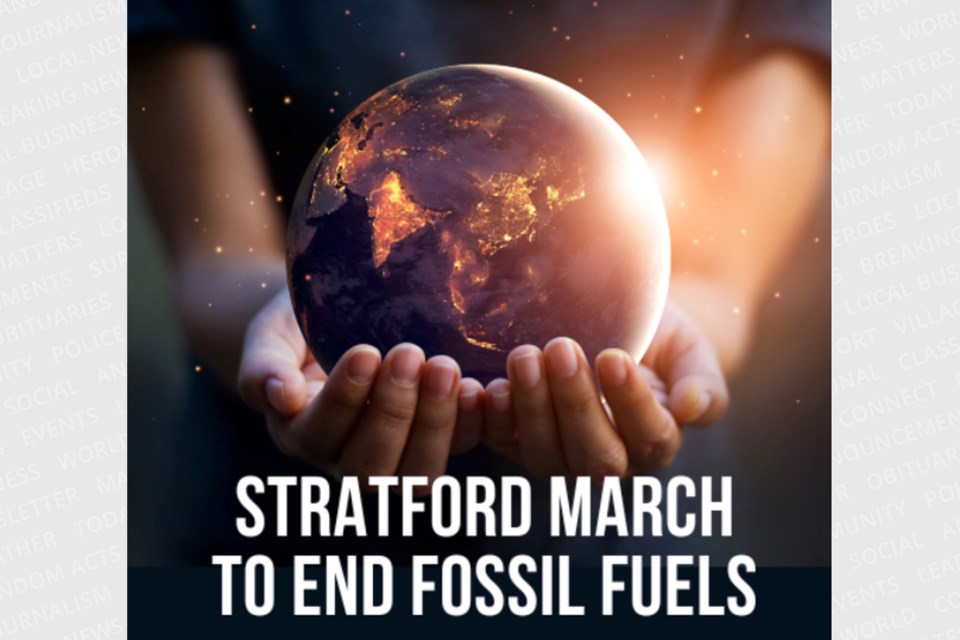True or false, Plastics have nothing to do with fossil fuels.
True or false, Fossil Fuels just refer to the gas/diesel we put into our vehicles.
True or false, Fossil Fuels have nothing to do with Natural Gas or Liquid Natural Gas.
True or false, hydrogen energy is free from fossil fuels.
True or false, fossil Fuels have nothing to do with climate change.
This coming weekend there will be marches around the world to encourage governments, industries and individuals to find alternatives to fossil fuels – rapidly, and with just transition. Here in Ontario there are many, in Toronto, in London, in K-W, in Hamilton and more, and coast to coast from Nanaimo to Charlottetown.
There will also be a march in Stratford!
Simply put, why?
To look at the bigger picture first, the vast majority of world scientists agree that the signs of a warming planet that we face every day are directly linked to fossil fuel production and use. A warmer Earth has happened before, but never so quickly, never so directly linked to the industrial production of CO2.
If you’ve not seen it, the hockey stick graph shows the rocket climb of CO2, and places it squarely in the timeline of Earth and human industry.
That CO2 derived from our production and use of fossil fuels is accumulating in our atmosphere, forming a sort of envelope around the planet. That envelope keeps the heat generated by the planet and by the sun, from escaping. In a nutshell, that is causing drought, floods, forest fires, wild and unpredictable storms, and killer heat waves in areas around the world. That trend will continue to worsen if we don’t find some alternatives – quickly.
Well hey, I use electric heat and ride a bike, no fossil fuels on me! You would be so amazed at the ways in which fossil fuels have become part of our lives. They are way beyond just the fuel in our vehicles: from industrial engines to cosmetics, from coal-powered electricity to grocery store packaging of all kinds (not just plastic bags), and from flame retardants on clothes and furniture to pesticides.
Speaking of plastic, almost 99 per cent of plastic is made from chemicals sourced from fossil fuels (ditch the plastic water bottle!). Because plastics production is part of the fossil fuels supply chain, many fossil fuel companies own plastics producers and many plastics companies own fossil fuel operations.
When it comes to energy, Liquified Natural Gas (LNG) is typically 85-95 per cent methane, which contains less carbon than other forms, but it is still a fossil fuel product (methane, by the way, is an even more powerful greenhouse gas than carbon), derived from Natural Gas (NG), also formed from fossil fuel gas, and high in methane content.
What about hydrogen? Green, right? If the hydrogen is formed from sustainable fuel, such as hydroelectric power (water), wind, solar or nuclear, then yes, it’s a green form of energy free from fossil fuels. Any of the greys to black to brown hydrogens are very high in carbon and methane release. Blue hydrogen depends on capture of carbon emissions, and on control of methane release, difficult processes.
Maybe the end fossil fuel movement has something important to say about our future – and the future of life on Earth. We speak about planning for seven generations. It’s beginning to look as if we’d better start yesterday, seeking a rapid, just, and equitable end to fossil fuels. Join the Stratford march!
Newsflash:
From the Guardian newspaper, the current level of carbon (CO2) in the atmosphere:
419.6 ppm (parts per million), September 2023
Safe level:
350 ppm, passed in 1990
Newsflash:
Goldenrod favoured by pollinators! 20 different pollinators counted on 3 plants. Pollinators not at all interested in passers-by, busy collecting pollen.
Goldenrod pollen too heavy to be inhaled- not an allergen.
Ragweed the evil allergen. Light pollen, hardly noticeable plant.
Newsflash:
From Katherine Hayhoe, Canadian atmospheric and climate scientist:
“This is literally what the science says: every bit of warming matters, and every action and every choice matters, too."
